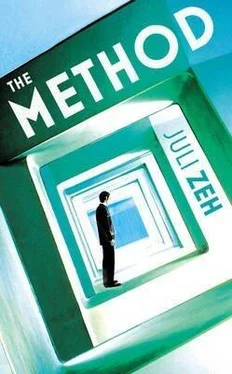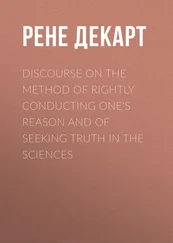‘You should be celebrating,’ says the ideal inamorata. ‘I know your lawyer talks too much, but he’s actually talking sense.’
The storm has reached the turbines; they spin faster and faster, the blades appear to evanesce. Mia imagines the thrum becoming louder, swelling to a roar, and the turbines lifting off the ground, a formation of a thousand aeroplanes, with only their propellers in sight. They lift their noses towards the sky and make a steep ascent, pulling the city with them.
‘From now on,’ says Mia slowly, ‘ his name negates all reason. From now on, I’ll do everything for love and free from fear.’
‘I beg your pardon,’ says the ideal inamorata.
‘I’ve finally understood what you’ve been saying all this time. It’s not enough to believe someone. It’s not even enough to know they’re innocent. It’s about professing your loyalty.’
‘Exactly,’ says the ideal inamorata. ‘Now come here and have a drink.’
‘Listen,’ says Mia.
‘I’m listening,’ says Rosentreter with a tipsy smile. This is his first taste of alcohol.
‘Mia,’ says the ideal inamorata, ‘you haven’t been yourself for weeks and now you’re too much like you.’
‘I mean, really listen.’ At last Mia turns away from the window, takes a step into the room and looks at the ideal inamorata. ‘The Method,’ she quotes, ‘demonstrated its fundamental injustice by killing my brother — step two.’
‘True,’ says Rosentreter as the ideal inamorata lowers her eyes to the floor, ‘but we need to move carefully.’
‘Step three — I’ll call someone. But it won’t be him.’ She laughs in Rosentreter’s face. ‘He’s here already. Step four — compose a broadside. Step five — publish it.’
‘Mia,’ pleads the ideal inamorata, ‘take a moment to think things through.’
‘Dear heart, you were the one who wanted me to do something. You wanted a flagship, a figurehead.’
‘Mia,’ says Rosentreter cautiously, ‘who are you talking to?’
‘I’ve got the plague,’ says Mia, smiling. ‘Leprosy, cholera. I’m ill. I’m free.’
Rosentreter rubs his nose with the back of his hand. ‘You’re not ill,’ he says.
‘From now on I won’t turn round when I hear my name.’
‘We mustn’t let them harm you. We need you intact.’
As Mia walks towards Rosentreter, something lurks in her eyes that makes him shrink away.
‘I don’t need either of you,’ she says. ‘Get out of my apartment.’
‘Mia,’ says the ideal inamorata, ‘Moritz wouldn’t have wanted this.’
Mia hesitates for a moment. Her eyes scan the room.
‘Are you sure?’ she asks. ‘Really sure?’
The ideal inamorata says nothing. Mia picks up her glass and throws its contents at Rosentreter’s chest.
‘Leave,’ she says. ‘Take the alcoholic stench of your triumph and parade it through the streets! If you don’t want to meet the first violin, you’ll have to hurry …’
Rosentreter doesn’t move. Champagne is dripping from his suit. He wraps his jacket around his chest as if he were cold, takes a few steps back, turns and walks to the door. Mia watches him go, her hand resting on the ideal inamorata’s shoulder.
‘Do you want to know the truth?’ says the ideal inamorata. ‘You’re finished; you’re finished either way — which is exactly what you want.’
‘The truth,’ says Mia, ‘is only visible from the corner of one’s eye. The moment you look at it squarely, it becomes a lie.’ She picks up the phone and taps in a number. ‘Put me through to Heinrich Kramer.’
‘I WAS WONDERING how you felt about it.’
‘About what?’
‘Life.’
Mia is boiling some water in the kitchen. She gets out two cups and cuts a few slices of lemon. She looks briefly into the living room as if to satisfy herself that her guest hasn’t left.
‘Oh,’ says Kramer. ‘Very neat. Really.’
He is sitting on the sofa beside the ideal inamorata, and he is back to his usual self. His cheeks are neither pallid nor flushed and his hands are out of his pockets. The awkward situation he got into in the courtroom will haunt him for the rest of his life.
He sees Mia looking at him, and smiles. ‘I have a beautiful wife with long brown hair and two lovely children who cling to my legs and shout “Daddy!” as soon as I walk through the door.’
‘Sounds wonderful.’
‘It is wonderful. A centuries-old arrangement. In our personal relations, we’ve lived with the same basic model for thousands of years. Humans are programmed for a limited range of modes: love, hatred, fear, happiness, trust …’
‘Revenge …’
‘Yes, revenge, too. If you think about it, human existence is very simple. Happiness is a case in point. There are two basic categories for describing experience: positive, which means beneficial or propitious; or negative, which means disadvantageous or harmful. The key to happiness lies in filling one’s life with experiences from the first category and avoiding the second.’
‘It certainly sounds convincing.’
‘It is. And how are you? Why don’t you tell me about your life? Where’s your husband? Where are your children?’
‘I ask the questions,’ says Mia, coming in from the kitchen and applying herself to serving two cups of water in an unconditional and perfect way. ‘You can turn the screws on me, but I’d advise you to be careful: my brother is dead, and your conscience is a dog that wants to lick my hand.’
‘I don’t have a conscience, Frau Holl.’
‘No, but you understand political necessity, which amounts to the same.’
‘Very good,’ says Kramer, laughing. ‘You’re learning to use your weapons.’
‘How does it feel to be on the receiving end?’
‘An experience from the second category, I’m afraid.’ Kramer sips his water carefully. ‘Yesterday, before your acquittal, a group of protesters gathered outside the courthouse. There weren’t many of them — somewhere in the region of a hundred, according to the police. Still, the Method isn’t keen on such gatherings.’
‘And yet your colleagues are flirting with my case.’
‘The majority of them, yes. Even supposedly like-minded journalists … You know Herr Wörmer from What We All Think ?’
‘What of him?’
‘I suppose you could call him a protégé of mine. Anyway, Herr Wörmer took it upon himself to suggest that the value of a political system might lie in its ability to adjust to new developments, to arrange itself around the situation like a well-fitting coat. According to him, legitimate governments are like custom-made shoes that never pinch or rub. As if Wörmer knew the first thing about footwear! All of a sudden my colleagues are scrambling over each other to criticise the system.’
‘You’re not tempted to convert?’
‘Don’t insult me, Frau Holl. Accuse me of whatever you like, but not of opportunism.’
‘Spoken like a true fanatic.’
‘Spoken like a man of honour. I’m not interested in adjusting the system, and I don’t give a damn about footwear or coats. The situation has taken an unfavourable turn. I’m ready to fight to the last drop of blood, as they used to say in the good old days.’
‘There’s one thing I don’t understand,’ says Mia. ‘I can still hear you telling me that the human condition is a pitch-black room in which we crawl around like newborn babies. Why are you intent on spilling blood? The last drop, indeed?’
‘I’m a believer, Mia, and this is my crusade. I believe in a political right to good health, derived from our inborn will to live. I believe that a system can only ever be just if it takes the body as its starting point. I believe that all men are equal in body , not in mind. Most of all, the Method’s vision of humanity is superior to all that came before.’
Читать дальше












